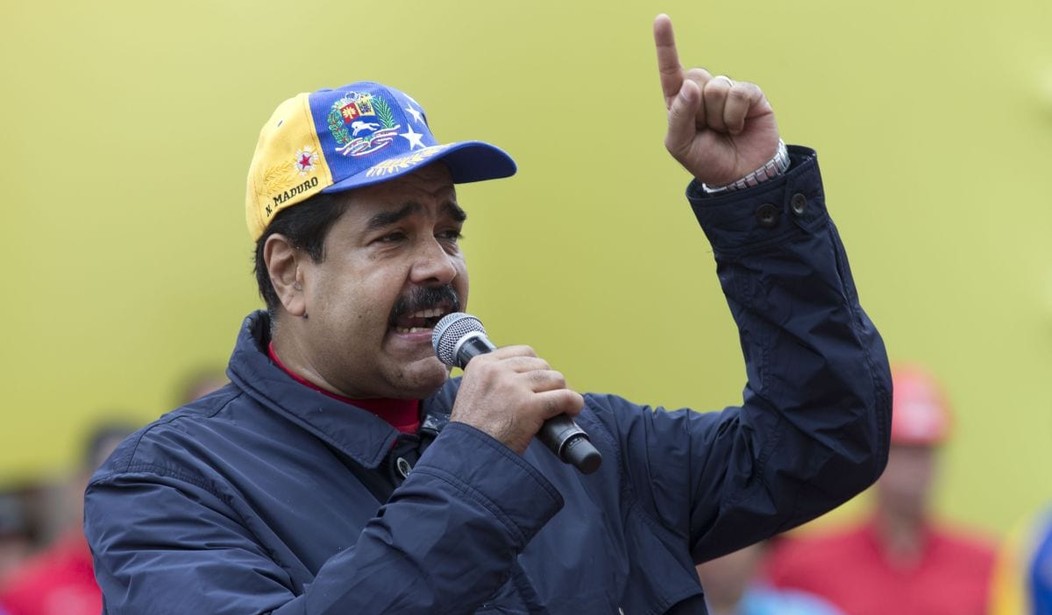Venezuelan President Nicolas Maduro extended a state of emergency another 60 days as several riots broke out in grocery stores this past week. The country is running out of food, the workweek has been reduced to two days, there is a water shortage and — soon — a gasoline shortage in a country with more oil than Saudi Arabia, there are long blackouts as electricity is scarce, and 70% of the voters want Maduro out this year.
Welcome to the socialist paradise.
U.S. officials told reporters that Maduro will probably not serve out his term, which ends in 2018.
In a bleak assessment of Venezuela’s worsening crisis, the senior officials expressed doubt that unpopular leftist President Nicolas Maduro would allow a recall referendum this year, despite opposition-led protests demanding a vote to decide whether he stays in office.
But the two officials, briefing a small group of reporters in Washington, predicted that Maduro, who heads Latin America’s most ardently anti-U.S. government and a major U.S. oil supplier, was not likely to be able to complete his term, which is due to end after elections in late 2018.
They said one “plausible” scenario would be that Maduro’s own party or powerful political figures would force him out and would not rule out the possibility of a military coup. Still, they said there was no evidence of any active plotting or that he had lost support from the country’s generals.
The officials appeared to acknowledge that Washington has little leverage in how the situation unfolds in Venezuela, where any U.S. role draws government accusations of U.S.-aided conspiracies. Instead, the administration of President Barack Obama wants “regional” efforts to help keep the country from sliding into chaos.
“You can hear the ice cracking. You know there’s a crisis coming,” one U.S. official said. “Our pressure on this isn’t going to resolve this issue.”
Maduro hit back on Friday night, blasting what he said was a meeting “to conspire against Venezuela” in Washington.
“Washington is activating measures at the request of Venezuela’s fascist right, who are emboldened by the coup in Brazil,” he said during a televised broadcast in reference to this week’s impeachment of fellow leftist Dilma Rousseff in Brazil.
Maduro, 53, then declared a 60-day state of emergency which includes the “necessary measures” to protect Venezuela in the event of a foreign attack, he said, without providing details. [L2N18B014]
Mobs in Venezuela have stolen flour, chicken and even underwear this week as looting increases across the crisis-hit OPEC nation where many basic products have run short, and the U.S. officials said this could spiral into widespread unrest. Soldiers fired tear gas at stone-throwing protesters on Wednesday as Venezuela’s opposition marched to pressure electoral authorities into allowing a recall referendum against Maduro.
Maduro has sworn he will not be forced out before his term expires in 2019 and accuses the opposition of seeking a coup against him to destroy the socialist legacy of his predecessor, the late Hugo Chavez. Washington has had an acrimonious relationship with Caracas for years, especially following U.S. support for a short-lived 2002 coup against Chavez.
The U.S. officials insisted that the United States was not “rooting against” Caracas but just wanted to see the crisis defused.
They expressed concern for a possible spillover to its neighboring countries, especially Colombia, but said most of the instability would be “self-contained” to Venezuela.
The annual inflation rate is expected to be 720% this year. This means that people can’t even afford a loaf of bread:
With the economy dead, the only thing remaining is to watch as society implodes. To that end, Oscar Meza, Director of the Documentation Center for Social Analysis (Cendas-FVM),said that measurements of scarcity and inflation in May are going to be the worst to date. “We are officially declaring May as the month that [widespread] hunger began in Venezuela,” he told Web Noticias Venezuela. … “As for March, there was an increase in yearly prices due to inflation — a 582.9 percent increase for food, while the level of scarcity of basic products remains at 41.37 percent.”
Meza said the trigger for the crisis is the shortage of bread and other foods derived from wheat.
“Prices are so high that you can’t buy anything, so people don’t buy bread, they don’t buy flour. You get porridge, you see the price of chicken go up and families struggle … lunch is around 1,500 bolivars… People used to take food from home to work, but now you can’t anymore because you don’t have food at home,” Meza said.
As long as Maduro and the socialists keep insisting that the crisis is the fault of the U.S. and the “right-wing businessmen,” Venezuela will remain in chaos.










Join the conversation as a VIP Member